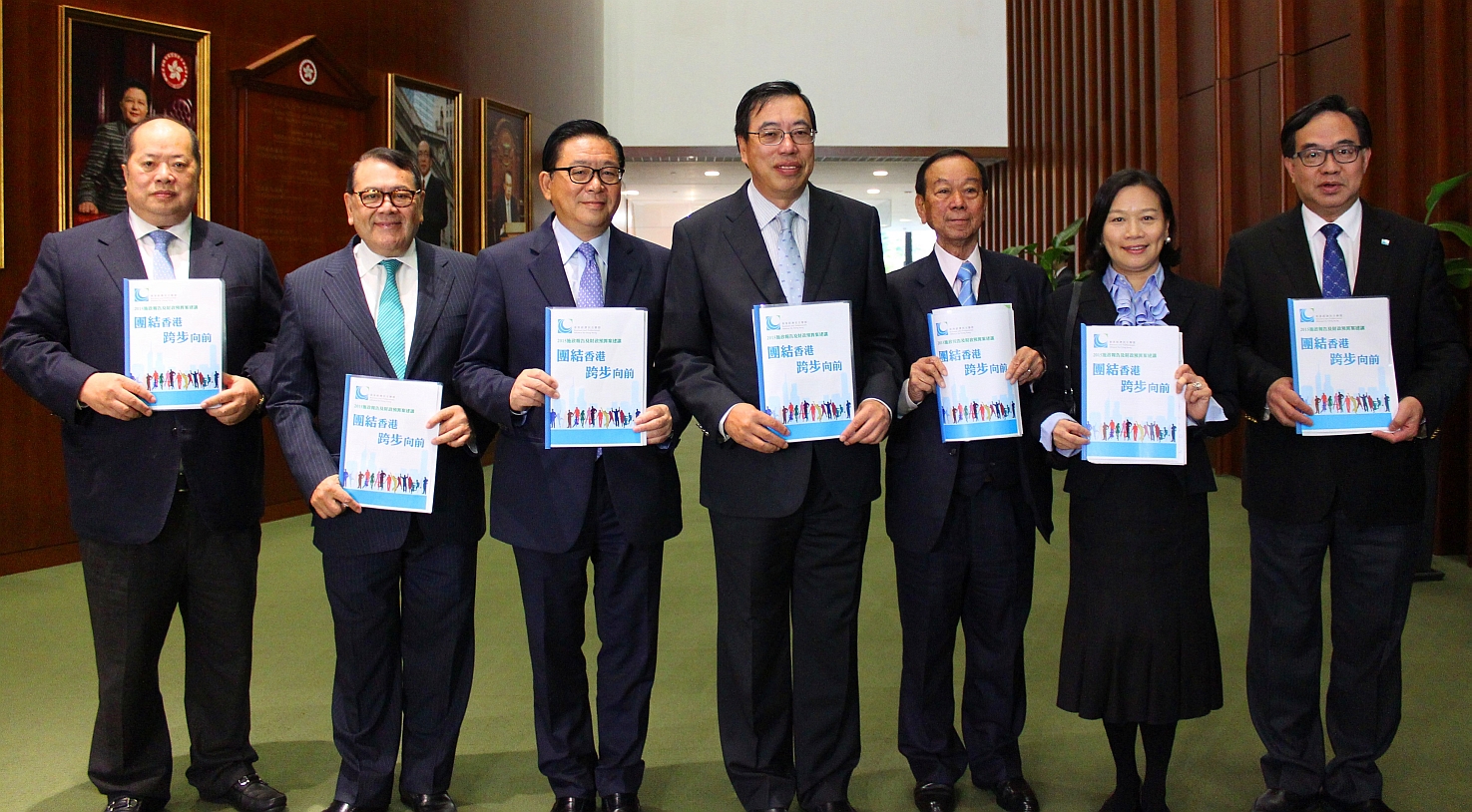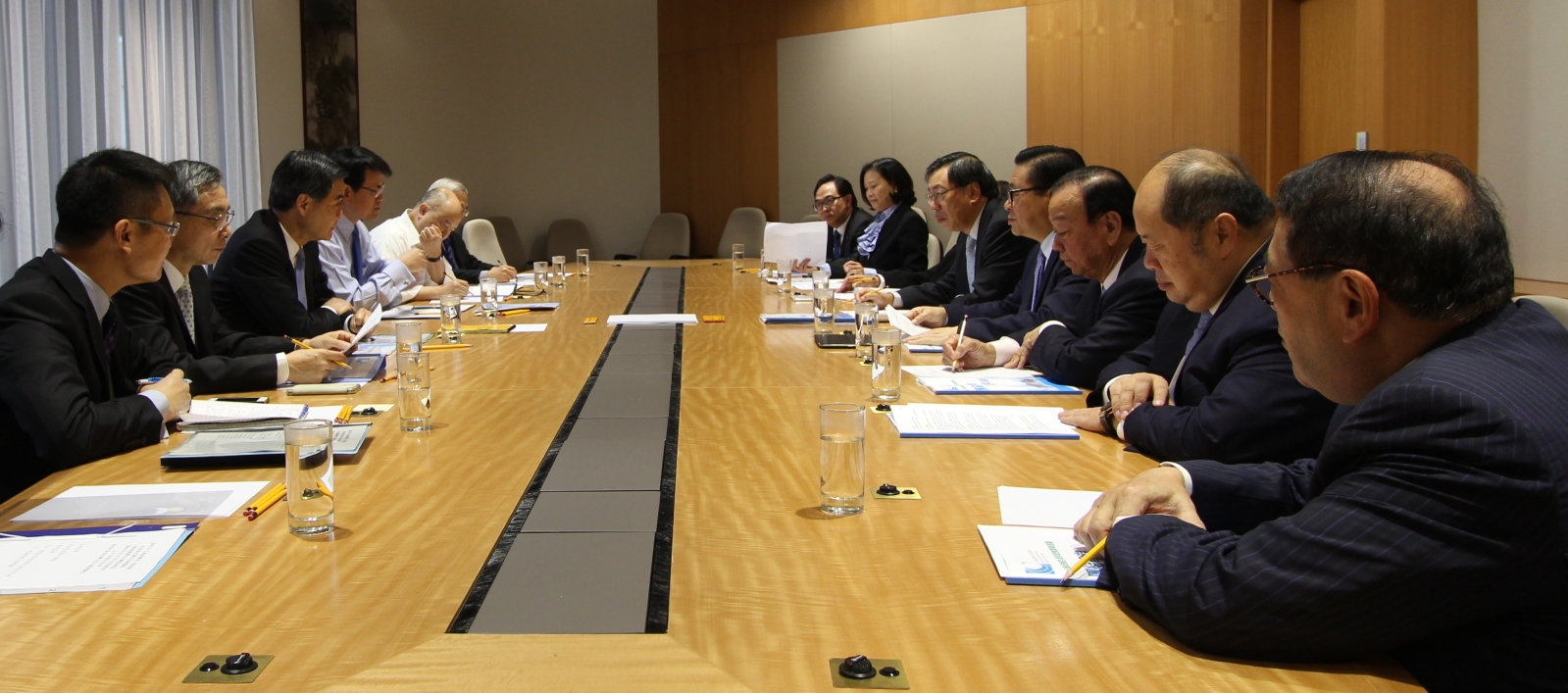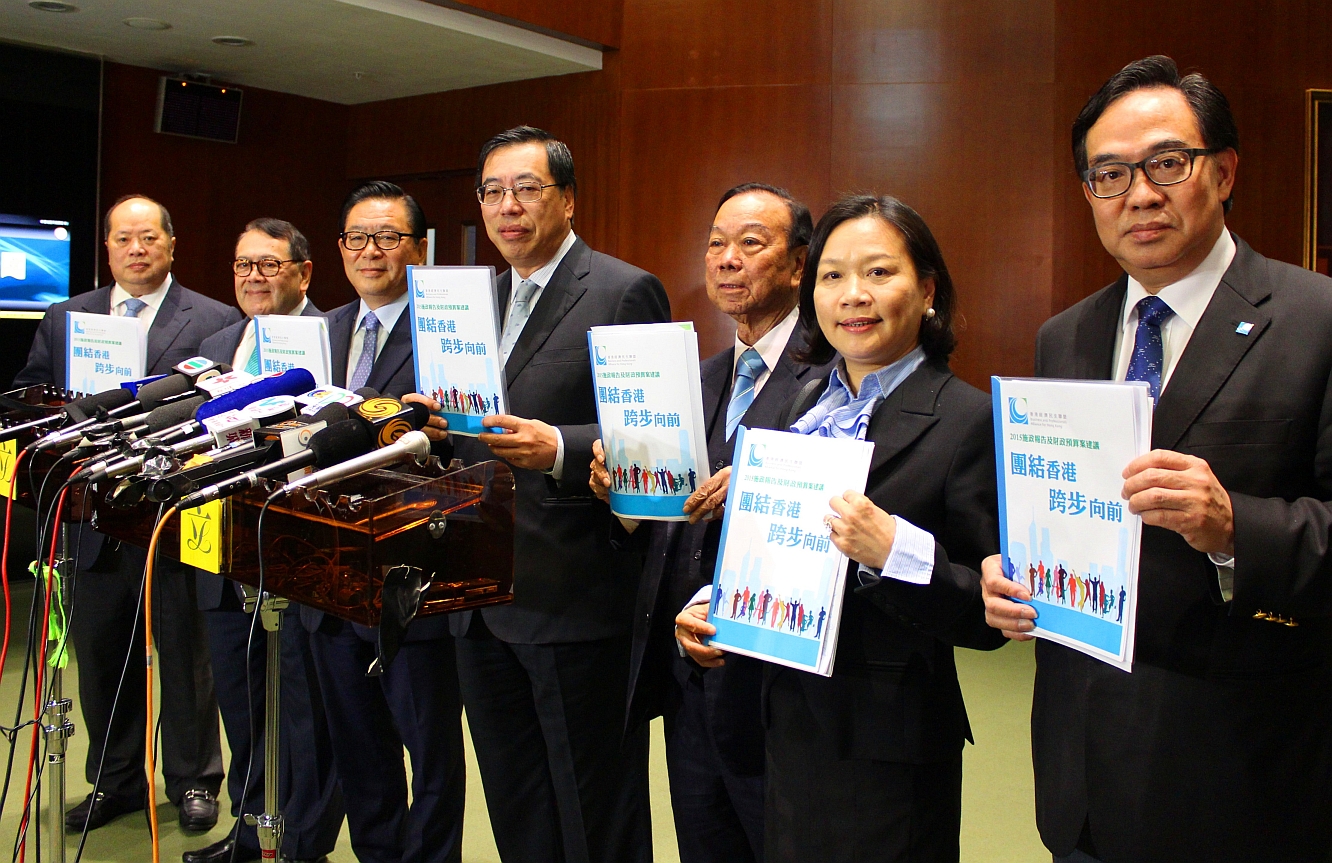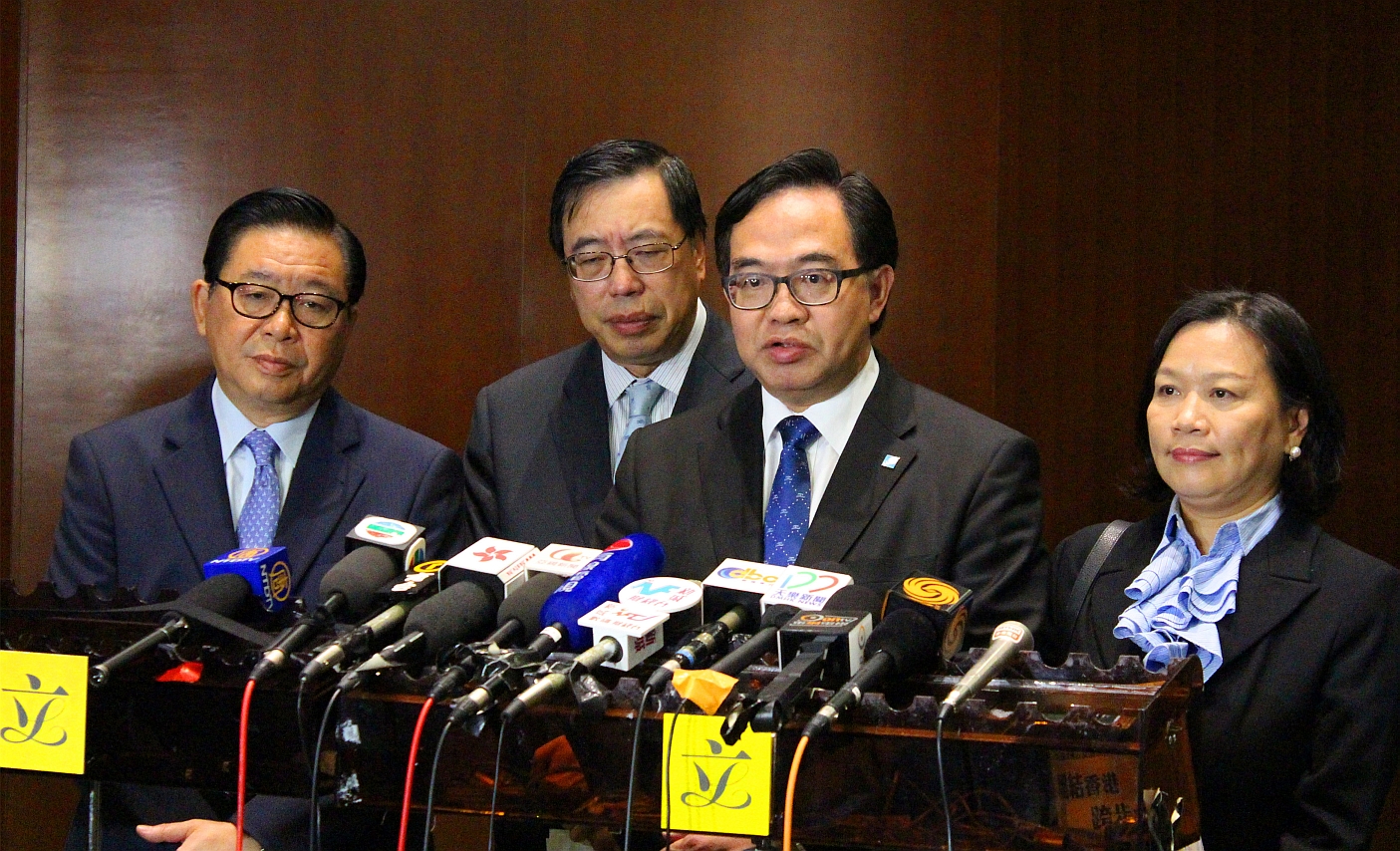
At a meeting today (13 November), the Business and Professionals Alliance for Hong Kong (BPA) presented nearly 250 proposals to the Chief Executive, Mr Leung Chun-ying. The proposals are based on comments from experts, as well as inputs from the business, industrial, and professional sectors and the broader community. The proposals are concerned mainly with the themes of promoting reconciliation, breaking the current sociopolitical impasse, and driving economic prosperity.
The Chief Executive responded positively to the proposals, especially on such suggestions as promoting upward mobility among the younger generation, organising uniquely local tourism events, and establishing a platform on political reform that is open to all political parties and interest groups.
Mr Andrew Leung Kwan-yuen, BPA Chairman, stressed the importance for “the business and professional sectors to broaden their scope of interest beyond economic development issues to also include social cohesion in Hong Kong.” He said, “The pace and degree at which society is becoming fragmented has now reached a level that is both unprecedented and alarming. This is becoming a real threat to our city so much so many livelihood-related projects have been suspended due to dragged-out political differences. We hope that, through our proposals, these will be useful in facilitating reconciliation, promoting harmony and rebuilding social cohesion in Hong Kong.”
As regards our younger generation, the cornerstones of enhancing education, promoting upward mobility, and ensuring sufficient support remain very much a centerpiece of the BPA’s proposals this year. Mr. Leung said concrete suggestions have been put forward to provide better guidance on career planning for those who have recently joined or are about to enter the workforce. For example, it has been suggested that the Government should work with the Hong Kong Trade Development Council and the business community in organising a large-scale career expo and forum. Dr. Priscilla Leung Mei-fun, BPA Legislative Councilor, also suggested that the Government organize events similar to the highly successful “Hong Kong Wine & Dine Festival” held earlier this year as a means to create a sense of lightheartedness across society and to provide opportunities for our young people to display their talents.
The BPA also urges the Government to introduce concrete policies and measures that would have the positive effect of expanding the middle-class to 50% or more of the population within the next decade. The Government should also offer support for the underprivileged in order to encourage mobility of all social classes.
Mr. Jeffery Lam, BPA Vice Chairman, pointed out that the after-effects of Occupy Central would begin to be felt across the economy with sectors such as catering, retailing, tourism and logistics being the hardest hit. The BPA has therefore drawn on the experience of the Government’s response to SARS in 2003 by calling on the Government to extend similar assistance to small and medium enterprises (SMEs) through such means as the provision of low-interest loans for the purpose of tiding over challenging times, enhancing Hong Kong’s competitiveness and maintaining a business friendly environment.
Dr. Lo Wai-kwok, BPA Vice Chairman, added that to vitalize local industries, facilitate innovation, and promote talent development in Hong Kong, the BPA has suggested providing tax relief equivalent to 300% of capital expenditure made on locally conducted R&D projects. Mr Christopher Cheung Wah-fung, BPA Vice Chairman, said that although Hong Kong’s financial sector had enjoyed a string of positive developments recently, which included the implementation of the Shanghai-Hong Kong Stock Connect and the removal of the daily Yuan conversion limit, he added that policy support from the Government was still badly needed to safeguard Hong Kong’s position as a global financial centre. He suggested that the Government should also give serious consideration to a feasibility study on the introduction of a Shenzhen-Hong Kong Stock Connect.
Hong Kong’s development has been impeded by ongoing political disputes over the past year. In the face of such challenges, the BPA has met with representatives from trade and industry, professional sectors and the local community over the last few months to gather input on a wide range of issues. Many useful comments and views were received. These included encouraging youth upward mobility, supporting the middle-class, facilitating creativity, raising competitiveness, boosting tourism, promoting green lifestyle and enhancing community care. In addition, we look forward to the next stage of the public consultation on the method for selecting the next CE through universal suffrage. We remain hopeful that society will reach a consensus that will pave the way to the eventual implementation of a “One man, One vote” process for the 2017 CE election.

Proposal Highlights:
Enhancing youth upward mobility
1. Establish a HKD5 billion funding scheme for young people through low-interest loans for business startups. Under this scheme, the Government would guarantee 80% of the principal and provide subsidies of up to 50% of the interest payable. Banks would be responsible for vetting applications. Business leaders and senior executives from major corporations would be enlisted to mentor young entrepreneurs;
2. Establish a HK2 billion “startup incubation park” with funding from government to provide one-stop service for young entrepreneurs;
3. Organise large-scale career fairs and forums that would provide at least 500 career opportunities for our young people. It is envisaged that the Government and the Hong Kong Trade Development Council would assume the key responsibility for overseeing such activities with input from the business community. Invite senior executives from leading enterprises (such as the Top 100 Chinese Enterprises) to share their experiences in career planning and business development at the proposed forums.
4. Subsidize Mainland and overseas placement programmes through matching funds. Encourage tertiary institutes to provide accreditation for such programmes.
Expand the middle-class
5. Increase Hong Kong’s middle class to account for more than 50% of the total population over the next 10 years;
6. Work with developers to provide affordable apartments for rent or purchase;
7. Increase the plot ratio for rural properties subject to the fulfillment of regulatory, environmental and safety requirements, as well as the settlement of land premium payable;
8. Rezone 2% of green belt land for subsidized housing projects including public rental housing, HOS housing, and youth hostels. This is expected to provide about 180,000 affordable flats for young adults and middle class families;
9. Expedite the construction of youth hostels by inviting the participation of non-government organizations. These hostels could then be rented out to citizens aged 35 or under at 60% of prevailing market prices.
10. Provide tax concession for households that have bought health insurance plans;
11. Waive rates for the Financial Year 2015-2016. Efforts should also be made to lower rates over the longer term.
Support for SMEs
12. Set up a government guaranteed loan programme similar to that set up in 2003 in response to the outbreak of Severe Acute Respiratory Syndrome (SARS) for the purpose of helping those SMEs adversely affected by the Occupy Movement;
13. Lower the threshold for loan eligibility by relaxing the current requirement that only caters to SMEs that have “not been in a loss-making position over the past three consecutive years”;
14. Reduce the stress test on mortgage repayment by SMEs, which can only borrow no more than 70% of the value of all owned property in use. The ability to repay, which is currently set at an assumed hike of 3% in interest rates, should be decreased to a hypothetical increase of 1.5-2% instead.
Financial development
15. Seek support from the Central Government in organising international financial conferences locally or overseas, as well as strengthening Hong Kong’s position as a global financial centre;
16. Relax licensing requirements to address manpower demands by the fast-growing asset management sector. For example, previously licensed asset managers or professionals with more than 10 years’ experience in asset management should be partially or completely exempted from license renewal obligations.
17. Review the Shanghai-Hong Kong Stock Connect 6 months after its launch. Give serious consideration to a feasibility study on introducing a Shenzhen-Hong Kong Stock Connect.
Vitalizing local industries
18. Require real estate developers to hire local artists/designers or procure their works/products for real estate projects whenever extra plot ratios are requested;
19. Provide HKD1 billion in government funding for the establishment of a “cross-border E-commerce platform”. The platform’s sophisticated payment and logistics system would enable young entrepreneurs in Hong Kong to sell locally designed, manufactured or sourced products to consumers on the Mainland.
Tourism development
20. Introduce tourism events or projects with uniquely local characteristics such as night markets or bazaars;
21. Develop Hong Kong as a “regional wine and dine centre” by simplifying the application procedures for “alfresco dining” to facilitate restaurants’ ability to cultivate an environment for leisure dining;
22. Government should adopt the Planning Department’s suggestion to rezone the top of the Exhibition Station on the Shatin to Central Link (SCL) as a “Comprehensive Development Area” for the building of convention and meeting facilities.
Infrastructure
23. Review and reprioritize the list of pending infrastructure projects to ensure construction resources are not over or under utilized respectively during high or low seasons;
24. Improve the current “Supplementary Labour Scheme” by relaxing application requirements for the purpose of easing labour shortages in certain sectors. Import labour in limited numbers and over a defined period provided job opportunities for local workers are not affected.
Environmental initiatives
25. Install self-service recycling machines in public areas and dispense concessions such as coins or coupons to encourage members of the public to participate in recycling;
26. Introduce the “Green Caterer Certification Scheme” and set up matching funds to subsidize the installation of food waste recycling facilities at restaurants and housing estates.
Community Care
27. Moderate application requirements for the Partnership Fund for the Disadvantaged so that community care projects initiated by the business community or charities, such as the “333 Learning Companion Leadership Programme”, can be operated in a sustainable manner through ongoing support from the Government.
Political reform
28. Launch the next stage of a public consultation on the method to select the next CE in 2017.
 |
 |

 Follow
Follow